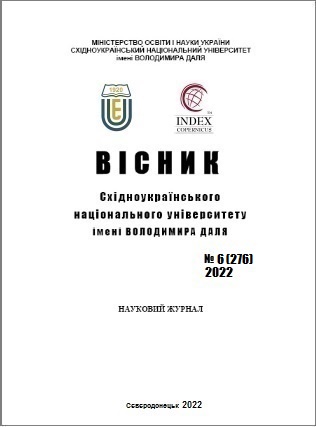Peculiarities of logistics activity in the conditions of digitalization
DOI:
https://doi.org/10.33216/1998-7927-2022-276-6-50-54Keywords:
logistics activity, logistics, digitalization of logistics processes, logistics process, logistics tools, digitalization of the logistics process, digitalizationAbstract
The work presents a study of the main features of digitalization of logistics activities. That is why digitalization not only changes technologies, but also the culture of work and consumption. For example, the demand for e-commerce is growing, which requires more efficient and flexible logistics systems and the acceleration of adaptation of all logistics processes.
Digitalization can also help solve environmental problems by reducing unnecessary travel and carbon emissions. For example, the use of drones and autonomous vehicles can reduce shipping costs and provide a greener logistics system, optimizing the logistics process comprehensively.
In this regard, companies that want to work successfully in digitalization must be ready for changes and quickly adapt to new technologies and consumer demands. It is also important to ensure the quality and security of logistics services in the context of the growing amount of data and ensuring digital security.
The main trends of digitalization of logistics activities include the following aspects:
Using the Internet of Things (IoT).
Use of warehouse automation system. Use of artificial intelligence and machine learning.
Use of blockchain technology.
Use of drones and autonomous vehicles.
Use of electronic communications and communication technologies.
Use of mobile applications and online platforms.
The development of e-commerce and the growth of online sales.
Expanding international trade and increasing globalization.
Development of ecological logistics and reduction of the impact of logistics on the environment.
These trends show that digitalization of logistics activities is becoming more and more necessary for effective and competitive management of logistics processes in modern business conditions.
Therefore, digitalization is a necessary element of logistics activity, which allows to increase the efficiency, accuracy and quality of services, as well as to reduce costs. Companies that are ready for changes and quickly adapt to new technologies will be able to work successfully in digitalization and ensure their competitiveness in the market.
References
1. Дикань В.Л. Актуальность улучшения системы комбинированных перевозок в международной транспортной сети. Вісник економіки транспорту і промисловості: Зб. наук.праць. Харків: УкрДАЗТ, 2006. № 13. С. 13–20.
2. Крикавський Є.В. Логістична концепція європейської інтеграції економіки України / Є.В Крикавський // Випуск XXIV НАН України. Львів: Інститут регіональних досліджень. 2001. С. 555–558.
3. Михальчук Л. Ю. Аналіз впливу логістичних витрат на ефективність функціонування логістичної системи. Вісник Хмельницького національного університету. 2009. №1. С. 30–34.
4. Mariya Naumenko, Nataliia Valiavska, Mariia Saiensus, Olena Ptashchenko, Vitalii Nikitiuk, Anton Saliuk, Optimization Model of the Enterprise Logistics System Using Information Technologies, International Journal of Management, 11 (5), 2020, pp. 54-64. http://www.iaeme.com/IJM/issues.asp?JType=IJM&VType=11&IType=5
5. Птащенко О.В., Кущ Я.М. Особливості логістичної діяльності в різних умовах господарювання. Бізнес Інформ. 2019. №12. C. 234–239.
6. Птащенко О.В., Архіпова Д.Є. Особливості логістичного процесу в сучасних умовах господарювання. Науковий фаховий журнал «Вісник Київського національного університету технологій та дизайну. СЕРІЯ «ЕКОНОМІЧНІ НАУКИ». – Київ, КНУТД, 2019. - № 6 (141), 2019. – С. 148–155
7. Птащенко, О., Сохацька О., «Transport logistics as a tool for increasing the efficiency of the organization». Вісник східноукраїнського національного університету ім. В. Даля, вип. 4 (274), 2022, с. 48-52
8. Сток Дж. Р. Стратегическое управление логистикой / Дж. Р Сток., Д.М. Ламборт. – М.: ИНФРА-М. 2013. 797 с.
9. Устенко М.О «Основні проблеми транспортної логістики» УкрДАЗТ // Вісник економіки транспорту і промисловості. 2010. № 29. С. 2–5.
10. Хазанович О. І. Система матеріально-технічного забезпечення. Ретроспектива розвитку та напрямки удосконалення / О. І. Хазанович. К. : Наука і оборона. 2007. № 1. С. 53-57.
11. Prokopenko, O., Kichuk, Ya., Ptashchеnko, O., Yurko, I., & Cherkashyna, M. (2021). Logistics Concepts to Optimise Business Processes. Estudios de Economia Aplicada, 39(3), Article number 4712.
12. Svetlana Khaminich, Eduard Kuznietsov, Olеna Ptashchеnko, Lina Halaz, Viktoriia Milcheva, Olga Boiko, Managing the Product's Creation of an Innovation-Oriented Engineering Business, International Journal of Advanced Research in Engineering and Technology, 2020, 11(4), стр. 278–289.

